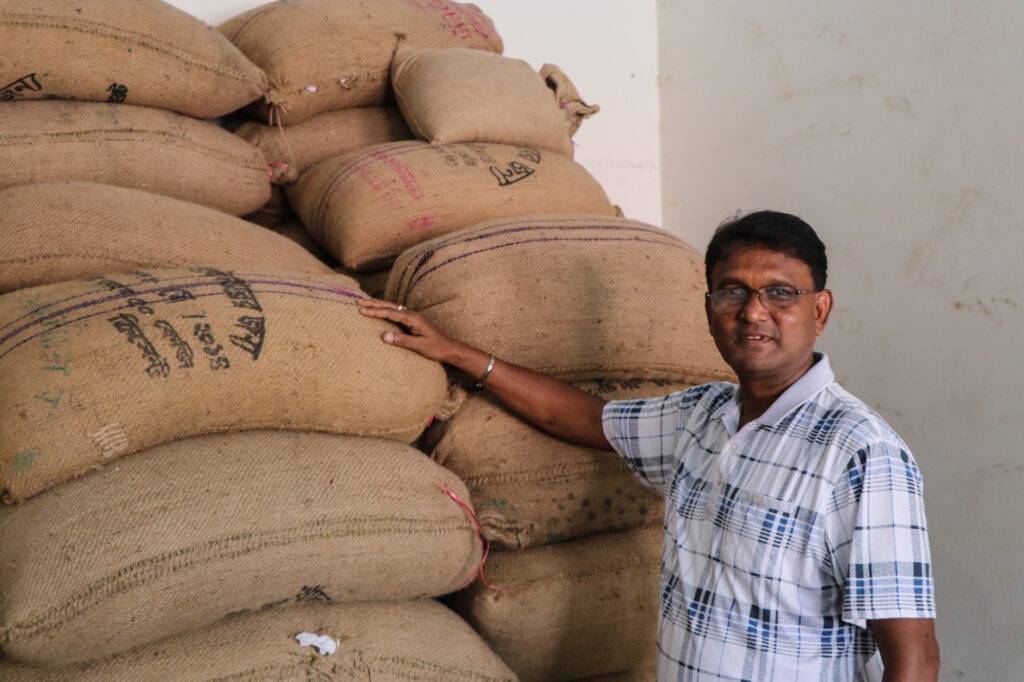
Tahmina, who lives in the village of Galachipa in the Barguna District of southwestern Bangladesh, first started farming after one of the country’s worst natural disasters, 2007’s Cyclone Sidr. “All the crops were destroyed,” Tahmina said. “It took about two years before we could start cultivating it again.”
This coast district near the Bay of Bengal is one of the poorest, most remote regions of the country. Half of its farmers grow only one crop per year because of challenges like high soil salinity, frequent cyclones, a lack of knowledge about crops, and remoteness to markets.
Tahmina did not inherit land when she married. Instead, she leases 80 decimals, while her husband works as a day laborer in another village. “I had seen that my husband cannot make ends meet,” she said. “I have tried what I could do. After all, I had four children, and I wanted them to become educated.”
Tahmina struggled to support her family. Before Kazi Fokrul, owner of the Barguna-based company SACO Enterprise, visited Tahmina, she was unfamiliar with mung bean. “One day [he] told me there is a lentil that is bigger, if I [would] like to grow it. I said, ‘Please give it to me because I need to grow what has a higher yield,’” Tahmina said.
The Feed the Future Bangladesh Rice and Diversified Crops (RDC) Activity, funded by the United States Agency for International Development and implemented by ACDI/VOCA, signed an agreement with SACO Enterprise, which owns the only pulse processing mill in the Barguna District. The goal of the agreement was to boost operations of the mill, which was running at only 15 percent capacity because of its limited distribution network, lack of skilled workers, and low-quality supply of mung bean.
“Being the only mill here, there is a dearth of expertise,” Kazi said. “If there are more competitors, then it would be advantageous . . . There would be more labor movement here.” SACO Enterprise is piloting an inclusive model for sourcing mung bean from 600 farmers, including Tahmina, and 20 business group leaders in the Barguna District with the RDC Activity’s support.

Kazi Fokrul, owner of SACO Enterprise, at the company’s pulse processing mill, which is the only one of its kind in Bangladesh’s Barguna District.
The company is also training mill workers and sending its three field officers to provide demonstrations and advise farmers on cultivation techniques. “We have benefited well from their advice,” Tahmina said. She learned about irrigation, row planting, and when to apply fertilizer and pesticide based on a calendar that SACO Enterprise provided.
“I didn’t cultivate it this way before. This year the yield is higher . . . I harvested it three times. Last year I could [only harvest] one time; the plant had died.”
— Tahmina, a mung bean farmer and mother of four
Business group leaders, who are often local shopkeepers, tractor owners, or farmers in the villages, inspect the quality of the crop before buying small batches with their own funds and selling them to SACO Enterprise.
“We can buy the mungbeans from the market, but the beans from the market come in many varieties,” Kazi said. “We can’t get the assurance on the quality. Waste runs high, and, consequently, our loss increases. The mungbeans we get from the business group leaders are quality proof.”
Farmers also benefit from the newly established relationships. By selling to her business group leader, Tahmina saves on transportation costs and taxes.
“[Farmers] didn’t want to grow mung bean before. Now it is grown widely. The farmers have no anxiety whether they can sell it. They are getting a price that is higher than what they would get in the open market.
— Kazi Fokrul, owner of SACO Enterprise
Thanks to the success of the contract grower scheme, SACO Enterprise plans to expand its reach to 2,000 more farmers. The company also plans to move into online and national markets, including Dhaka, the country’s capital, with the support of a marketing agency employed by the RDC Activity.
After spending BDT 160 on two kilograms of seeds, Tahmina earned BDT 5,000 from her harvest. She used BDT 500 to pay the lease on her land and the remaining BDT 4,500 to buy books for her son. On average, farmers like Tahmina who participated in the scheme increased their profits from USD 84 to USD 145.
“I have profited well,” Tahmina said. “Whatever there was, I spent it for the family.” Although she did not have the opportunity to attend school herself, her sons attend fifth and ninth grade.
“What I have learned will be taken up by others. My children will learn,” Tahmina said. “They will say, ‘Our mother has given so much effort; we, too, will give the effort.’”







